QuestionI have two rabbits. One is in overnight observation for hairballs and gas after I took him to the vet today. They are going to keep him overnight, give him fluids through and IV, and they will try to get the hairballs out through medication. (Xrays showed gas 'something'- I don't remember exactly) He quit eating and drinking so it was obvious something was wrong. His mate, at home with me, is the one who's doing most of the shedding and he groomed her a lot. She's eating hay and veggies, but not much. She quit eating pellets. She is drinking water. Overall her behavior seems to be okay but should I bring her in, too, to have her checked? Also, if the overnight medication does not work and Peter requires surgery, do you know how successful that is usually? He's a little over 9 years old so I know the inherent risks associated with surgery. I will of course agree to surgery because I'd rather try something than nothing at all, but of course, I'm worried. Thanks for any advice or thoughts.
AnswerDear Michele,
I'll address the rest of the problem, now that I've urged you NOT to allow surgery on your bunny.
Step One. Reunite the bonded bunnies *immediately*. The fact that the vets didn't suggest this in the first place tells me that they are not very familiar with rabbit medicine. Bonded rabbit pairs should NEVER be separated, as they can grieve themselves to death over this separation, especially when they are sick. This is very likely the reason your female bunny has stopped eating. She misses her mate, and is highly stressed by his absence. Please get those bunnies back together NOW. Do not wait another hour, as time is of the essence.
Separating him from her will also increase *his* stress, and this, in turn, will exacerbate the intestinal problems he is having.
Step Two. Unless a bunny is in a true "bloat" situation (and there is no mistaking this: the rabbit bloats up quickly to non-rabbit proportions, with a hugely distended abdomen as hard as a watermelon), then any ingested hair and food are not causing a blockage. This, in turn, means that the problem can be treated medically, without surgical intervention.
"Hairballs" are very rare in rabbits, and not like those found in cats. Please read this article immediately:
www.bio.miami.edu/hare/ileus.html
and share this one with your vets, if they are amenable to such things:
www.bio.miami.edu/hare/ileus.pdf
(The latter is an article from a veterinary journal that describes the problem your bunny is experiencing (ileus) and how to treat it safely, without surgery.)
If Peter is over 9 years old, then a very likely culprit for his GI tract slowdown (which is what mimics a "hairball") is dental problems. These can be very painful in rabbits, and are common in older rabbits. You can read more here:
www.bio.miami.edu/hare/dental.html
and
www.bio.miami.edu/hare/sickbun.html
Pain/stress/illness elicit ileus, a rabbit's physiological response to stress. The gas and any "mass" in the intestines of Peter are a *result* of the ileus, not the other way around.
Of critical importance for moving an impacted mass of fur/food is *oral hydration*. We successfully treat this problem with:
1. Pain management (critical!) Banamine is excellent for abdominal pain, and can make all the difference in the world.
2. Simethicone (pediatric suspension) to control gas pain, and make gas easier to pass.
3. Subcutaneous fluid therapy (to be sure bunny is well hydrated)
4. Lactulose (this orally administered sugar is not absorbed by the body, and osmotically draws liquid into the gut, where it hydrates impacted material and gradually allows it to break up and pass).
5. Gentle, abdominal massage (this is described in the ileus article above)
6. Force feeding (It is vital to keep bunny eating, at least a little, to prevent hepatic lipidosis (fatty liver degeneration), which can start to occur rather quickly in rabbits who are not eating at all. Critical Care from Oxbow Hay Company (www.oxbowhay.com) is ideal for this purpose.
7. Intestinal motility drugs (metoclopramide and/or cisapride)
(NOTE: do NOT use petroleum laxatives of any kind before the intestinal contents are well hydrated with oral liquids and lactulose (after subQ fluids). These will coat a mass of desiccated intestinal contents, preventing hydration!)
I hope this helps get you started on your bunny's road to recovery. This is a very common problem, and unfortuantely many vets who are not very experienced with rabbits often misdiagnose it as a "hairball" and inadvertently kill rabbits with unnecessary (and contraindicated) surgery! It will take more than "over night" for this problem to resolve: getting the gut moving again can take days, and he may be a while in recovery.
But get him back with his mate (this alone will improve his outlook on life and will to live!) and home as soon as possible. Hospitalization is stressful, and the vets can show you how to do most of the above procedures at home. This is his best chance for recovery: gentle, patient care from you at home, with his loving mate by his side.
I hope this helps. Please write back if you have more questions.
Dana
~~~~~~~~~~~~~~~~~~~~~~~~~~~~~~~~~~~~~~~~~~~~~~~~~~~~~
Dana Krempels, Ph.D. ^
University of Miami Department of Biology ^
H.A.R.E. (Houserabbit Adoption, Rescue & Education) ^
dana@bio.miami.edu ^
"Those who would sacrifice liberty ^
for security deserve neither." ^
-- Benjamin Franklin ^
~~~~~~~~~~~~~~~~~~~~~~~~~~~~~~~~~~~~~~~~~~~~~~~~~~~~~

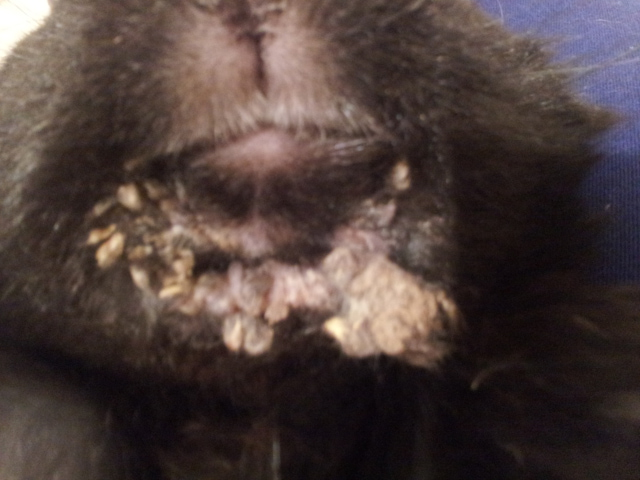 vet is stumped, ongoing scab under the chin
Question
Anyas chin
Hi my rescue bunny has had a
vet is stumped, ongoing scab under the chin
Question
Anyas chin
Hi my rescue bunny has had a
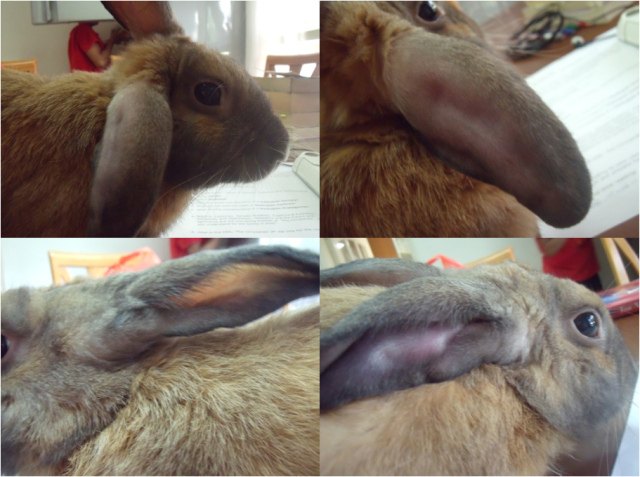 Swelling in Ear of Adult Rabbit
Question
Rabbits Swollen Ear
I adopted my rabbit
Swelling in Ear of Adult Rabbit
Question
Rabbits Swollen Ear
I adopted my rabbit
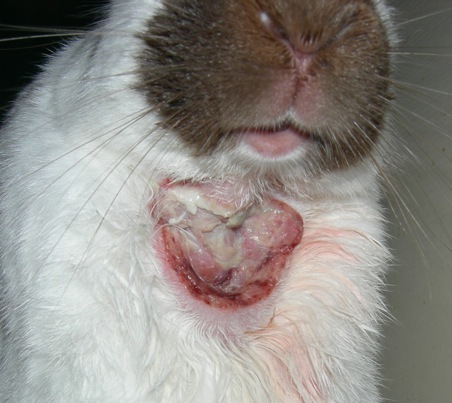 Huge Sore on Rabbits neck, Rabbit keeps biting it.
Question
Sore Picture
Months ago my rabbit had a little
Huge Sore on Rabbits neck, Rabbit keeps biting it.
Question
Sore Picture
Months ago my rabbit had a little
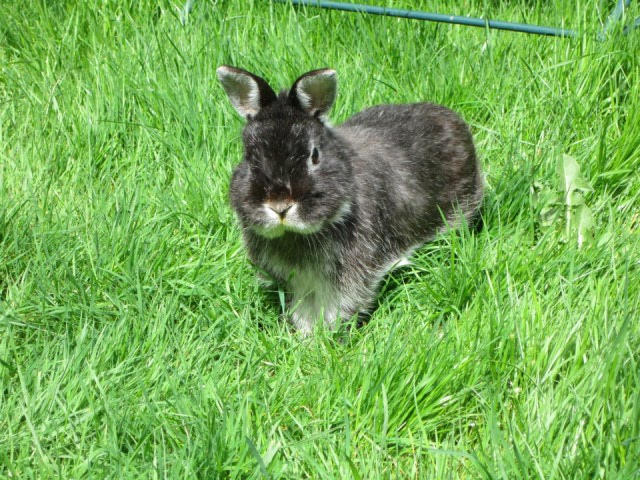 Rabbit with startling reaction to petting
Question
Bunny
I have a twelve year old male dwa
Rabbit with startling reaction to petting
Question
Bunny
I have a twelve year old male dwa
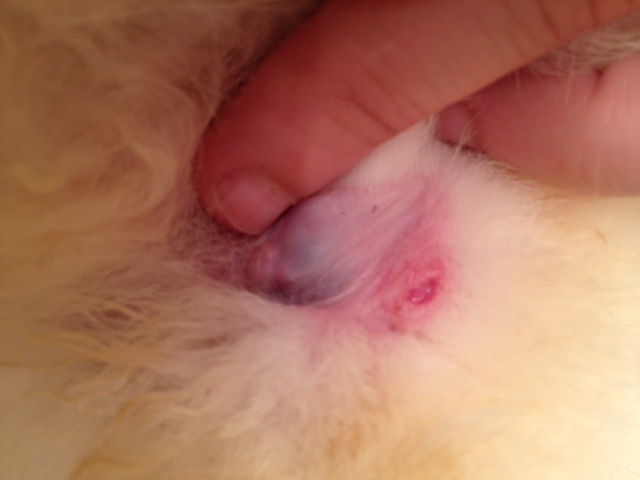 Male Rabbit Genitalia Picture
Question
Lump
Picture that goes along with my qu
Male Rabbit Genitalia Picture
Question
Lump
Picture that goes along with my qu